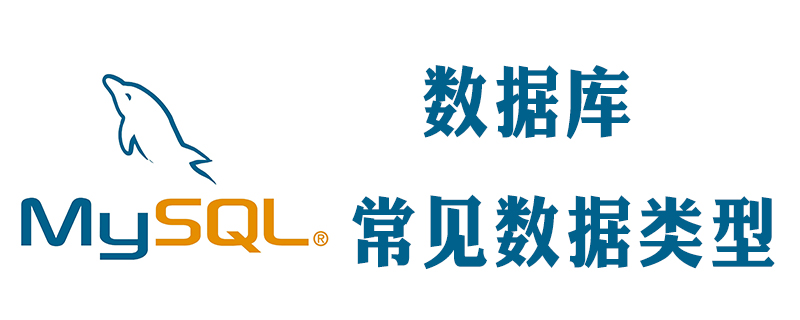Home >Database >Mysql Tutorial >What are the database data types?
What are the database data types?
- angryTomOriginal
- 2019-08-03 09:42:1520578browse

The types of data fields defined in MySQL are very important for the optimization of your database.
MySQL supports multiple types, which can be roughly divided into three categories: numerical, date/time and string (character) types.
Recommended tutorial: MySQL introductory video tutorial
1. Numeric type
MySQL supports all standard SQL numeric data types.
These types include strict numeric data types (INTEGER, SMALLINT, DECIMAL, and NUMERIC), and approximate numeric data types (FLOAT, REAL, and DOUBLE PRECISION).
The keyword INT is a synonym for INTEGER, and the keyword DEC is a synonym for DECIMAL.
The BIT data type stores bit field values and supports MyISAM, MEMORY, InnoDB and BDB tables.
As an extension of the SQL standard, MySQL also supports integer types TINYINT, MEDIUMINT and BIGINT. The following table shows the storage and range required for each integer type.
| Type | Size | Range (signed) | Range (unsigned) | Use | |||||||||||||||||||||||||||||||||||||||||||||||||||||||||||||||
|---|---|---|---|---|---|---|---|---|---|---|---|---|---|---|---|---|---|---|---|---|---|---|---|---|---|---|---|---|---|---|---|---|---|---|---|---|---|---|---|---|---|---|---|---|---|---|---|---|---|---|---|---|---|---|---|---|---|---|---|---|---|---|---|---|---|---|---|
| TINYINT | 1 byte | (-128,127) | (0,255) | Small integer value | |||||||||||||||||||||||||||||||||||||||||||||||||||||||||||||||
| SMALLINT | 2 Bytes | (-32 768, 32 767) | (0, 65 535 ) | Large integer value | |||||||||||||||||||||||||||||||||||||||||||||||||||||||||||||||
| 3 bytes | (-8 388 608, 8 388 607) | (0,16 777 215) | Large integer value | ||||||||||||||||||||||||||||||||||||||||||||||||||||||||||||||||
| 4 bytes | (-2 147 483 648, 2 147 483 647) | (0, 4 294 967 295) | Big integer value | ||||||||||||||||||||||||||||||||||||||||||||||||||||||||||||||||
| 8 Bytes | (-9,223,372,036,854,775,808, 9 223 372 036 854 775 807) | (0, 18 446 744 073 709 551 615) | Great Integer value | ||||||||||||||||||||||||||||||||||||||||||||||||||||||||||||||||
| 4 Bytes | (-3.402 823 466 E 38, -1.175 494 351 E-38), 0, ( 1.175 494 351 E-38, 3.402 823 466 351 E 38) | 0, (1.175 494 351 E-38, 3.402 823 466 E 38) | Single precision | Floating point value |
|||||||||||||||||||||||||||||||||||||||||||||||||||||||||||||||
| 8 Bytes | (-1.797 693 134 862 315 7 E-308, -2.225 073 858 507 201 4 E-308) ) E 308 ) | Double precision | Floating point value | ||||||||||||||||||||||||||||||||||||||||||||||||||||||||||||||||
| Depends on the values of M and D | Depends on the values of M and D | Decimal value |
| Type | Size (bytes) |
Range | Format | Purpose |
|---|---|---|---|---|
| DATE | 3 | 1000-01-01/9999-12-31 | YYYY-MM-DD | Date value |
| TIME | 3 | '-838:59:59'/'838:59:59' | HH:MM:SS | Time value or duration |
| YEAR | 1 | 1901/2155 | YYYY | Year value |
| DATETIME | 8 | 1000-01-01 00:00: 00/9999-12-31 23:59:59 | YYYY-MM-DD HH:MM:SS | Mixed date and time values |
| TIMESTAMP | 4 |
1970-01-01 00:00:00/2038 The end time is 2147483647 second, Beijing Time2038-1-19 11:14:07, January 19, 2038 03:14:07 am GMT |
YYYYMMDD HHMMSS | Mixed Date and time value, timestamp |
3. String type
String types refer to CHAR, VARCHAR, BINARY, VARBINARY, BLOB, TEXT, ENUM and SET. This section describes how these types work and how to use them in queries.
| Type | Size | Use |
|---|---|---|
| CHAR | 0 -255 bytes | fixed length string |
| VARCHAR | 0-65535 bytes | variable length string |
| TINYBLOB | 0-255 bytes | A binary string of no more than 255 characters |
| TINYTEXT | 0-255 bytes | Short text string |
| BLOB | 0-65 535 bytes | Long text data in binary form |
| TEXT | 0-65 535 bytes | Long text data |
| MEDIUMBLOB | 0-16 777 215 bytes | Medium-length text data in binary form |
| MEDIUMTEXT | 0-16 777 215 bytes | Medium length text data |
| LONGBLOB | 0-4 294 967 295 bytes | Extremely large text data in binary form |
| LONGTEXT | 0-4 294 967 295 bytes | Extremely large text data |
The CHAR and VARCHAR types are similar, but they are saved and retrieved differently. They also differ in terms of their maximum length and whether trailing spaces are preserved. No case conversion is performed during storage or retrieval.
BINARY and VARBINARY are similar to CHAR and VARCHAR, except that they contain binary strings instead of non-binary strings. That is, they contain byte strings rather than character strings. This means that they do not have a character set, and sorting and comparison are based on the numeric value of the column value bytes.
BLOB is a binary large object that can hold a variable amount of data. There are 4 BLOB types: TINYBLOB, BLOB, MEDIUMBLOB, and LONGBLOB. They differ in the storage range they can accommodate.
There are 4 TEXT types: TINYTEXT, TEXT, MEDIUMTEXT and LONGTEXT. The corresponding four BLOB types have different maximum storage lengths, which can be selected according to the actual situation.
The above is the detailed content of What are the database data types?. For more information, please follow other related articles on the PHP Chinese website!

